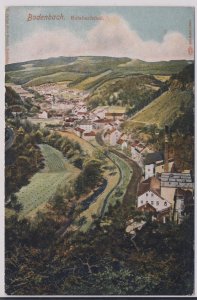
Industry

| Popis |
The shepherd's wall has been used since the earliest times as a source of building stone for the construction of houses in the vicinity. Significant sandstone mining took place here in the 1840s in connection with the construction of the Prague-Dresden railway line. Stones from the Shepherd's Wall were also used to a limited extent during the construction of a chain bridge over the Elbe in 1853-1855 and other constructions. The largest quarry was located on the southwest side of the massif near the sheep's bridge. The view of its quarry wall is now covered by the Teplická Street. The top of the quarry wall today provides a view of the Jílov Valley, which in the past became famous mainly for button making. The beginning of button making in Děčín is to be found in the first half of the 18th century, when the manufacture of buckles and tacks became a welcome benefit for the inhabitants of the mountainous and poorly fertile area on the border of the Elbe Sandstones and the Ore Mountains. The first producer of cast brass and tin buckles was allegedly Christian Hieke in nearby Petrovice in Ústí nad Labem. The Theresian cadastre has already recorded twelve checkers in Petrovice, five studs in Jílové and one in Javor, Libouchec and Sněžník. At that time, studs from the estate were united into one guild, along with blacksmiths and locksmiths in Děčín. Metal buttons and other cast and embossed small metal products were soon added to the range of slippers and studs. From Petrovice, production soon expanded to the Děčín estate, especially to Tisá, where several button manufacture were established before the mid-19th century. At the time, buttonhole companies used home workers to a large extent. The actual production of buttons in the Jílov Valley started only in connection with the construction of the Duchcov-Podmokel railway, which allowed the expedition of products to the whole monarchy quickly and cheaply. At that time, besides the traditional metal buttons, turned buttons were also made of bones, and from the second half of the 1860s also shells of pebble nuts (the fruit of the Brazilian palm Phytelephas, which has a very strong ivory-like shell). The first button factory in the Jílové valley was founded in 1868 by the businessman Anton Paul with his partner August Konrad from Mikulášovice in No. 85 in Kamenná near Jílové. In the 1870s Adolf Pächter of Podmokely entered the company for a short time and then the company was called Pächter & Paul. In 1875 Adolf Pächter became independent and built his own company (No. 394, 395 and 396) at the boundary between the cadastral villages of Podmokly and Oldřichov in the narrow space between Teplická Street and the steep slope of Pastýřská stěna, where he introduced the same production of stone buttons as he knew. from Jílové. Adolf Pächter was not only a successful entrepreneur, but also the founder and first president of the Jewish religious community in Podmokly and initiator of the local synagogue. After his death in October 1915, his sons Alfred and Rudolf took over the company. At the end of the 1920s, the factory was in financial difficulty and in 1929, the heirs of Adolf Pächter sold it to a submarine merchant, Rudolf Soudek. He divided the building into smaller workshops and warehouses that he rented to various businesses. The upper floor served as a sales warehouse of the Podmokel joinery, under which the locksmithery Ing. Ritter. On July 14, 1932, a fire struck the building, destroying the upper floor of the building with furniture stores. The owner had the factory repaired and leased it to the company "Landhag" Ing. Passecker & Herrmann, who introduced the production of agricultural machinery. After the annexation of the Sudetenland to the German Empire, the building was transferred to the state, which in 1942 transferred it to the property of Podmokly. After the war, the building was taken over by Mr. Koh-i-noor, who rebuilt the factory to its present form in the 1960s and 1970s. After privatization in the factory, the company Stroj-Union s r.o., which manufactures machines for pressing metal buttons, rivets and clips, is based. |





